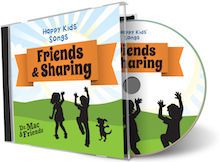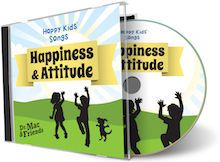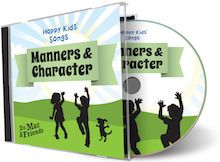I was recently asked to review several song sets from Happy Kids Songs for the TOS Review Crew. I reviewed Friends & Sharing, Happiness & Attitude, Manners & Character and the Happy Kids Songs Workbook: Hands-on Activities to Build Character, Social & Emotional Skills.
Let me be completely upfront here. These songs teach from a child psychologist viewpoint when it comes to character training (not surprising, since Dr. Mac is one). For many people, this will be exactly what they are looking for. For many parents, libraries, school systems, etc., this will probably be a great fit. For me, however, this was a fundament difference of approach. I tend to teach character from a Biblical viewpoint, which means that I handle emotions, lying, attitudes and the like very differently than the typical clinical model. Often, our viewpoints worked very well together with these songs, but often we clashed. You will see what I'm talking about as we take a look at the materials.
 |
| Happy Kids Songs were a good excuse to dance around the room. |
The Song Sets: The song sets are downloadable songs that you can pop into iTunes and then listen to on your favorite device, or you can burn them onto CDs -- whatever method you like best. I found them to be super easy to download and set up.
Sometimes the songs are sung by an adult, but more often, they sound like they are sung by talented kids. These are definitely geared to be "kids' music". They are upbeat and sugary-sweet. My 3 year old liked them, but my 10 year old son bolted out of the room with a groan when I played them. He's a little too cool for them right now.
Sometimes the songs are sung by an adult, but more often, they sound like they are sung by talented kids. These are definitely geared to be "kids' music". They are upbeat and sugary-sweet. My 3 year old liked them, but my 10 year old son bolted out of the room with a groan when I played them. He's a little too cool for them right now.
Sailing the Seven C's -- covers Caring, Consideration, Commitment, Communication, Concern, Curiosity, and Cooperation. It just mentions them. If you actually wanted to teach your child about each of these, you would definitely need more than just the song, but the song might be a good compliment to a study you were doing.
Everybody Wants to Find a Friend -- Tries to teach that your child should initiate the friendship in order to meet a new friend.
Sharing Friends -- Deals with being the "third wheel" or "odd one out".
Happy as Happy Can Be -- There doesn't really seem to be teaching point to this one. It's just a "happy just to be with you" type song.
Together -- Another sugary-sweet song about always being together because hey, we're best friends.
Shake It Out and Dance -- This song attempts to get kids to change an "I can't" to an "I can" by "dancing it out". It certainly gets the "I can't" message across, because the kids sing those words over and over, but I'm not sure it is successful in communicating an "I can" message. I also don't think doing a little dance is an appropriate method for dealing with an "I can't" attitude, anyway. This song was problematic for us, since we don't allow those words in our home. We try to teach our kids to say, "I need help" or "I'm having trouble with this" instead. I wan't comfortable with my kids singing "I can't, I can't, I can't." Just saying.
Who Knows What's a Kudo? -- How to give a kudo (a compliment)
I Don't Understand -- I had a real problem with this one. Here are some of the words:
"And teacher, help me, feed my brain. It isn't dumb, but it's become so plain. To see it's driving me insane..." Um... What!?! No. Just...No. We teach our kids to be very careful about what they say. Mark 11:23-24 teaches us that we can have what we say and I sure don't want them saying that. Just. No.
Be Good to Yourself -- This one is about saying good things to yourself and to others in order to have a happy day, so at least there's that. It's a little bit of a mixed message to tell the kids to say good things about themselves in this song, and then have them sing along to bad things in another, but at least this one has a good message.
Better Together -- Sugary-sweet -- "I'm okay by myself, but I'd rather be with you." Aww, thanks.
H-o-n-e-s-t-y -- A song about honesty (go figure). Don't lie. Tell the truth. 'Nuf said.
The Magic Word -- You should say please, kids. That's always a good reminder, right?
Quirks -- The song encourages kids to accept people's quirky and odd behavior, like sniffing, gurgling, burping, getting angry, winking, whistling, etc. It doesn't really tell you why you should, except to say that we all have quirks. Nor does it address what to do when someone's "quirky" behavior is hurtful.
The Golden Rule -- Starts off with name calling (Old Coot), and then goes on to say that we shouldn't do that. We shouldn't tease, we should be nice and we should treat others like we want to be treated. I don't like introducing new ammunition for name calling, even though we don't have a name calling problem at our house. Other than that, this song had a good message.
Six Little Kids -- This song was a little bit different. It's a story about six kids who have never seen an elephant. They close their eyes and each child goes to a different part of the elephant. The one who finds the tusk thinks it's a tree. The one who goes to the ear thinks it's a fan. The one who finds the tail thinks it's a rope. The moral of the song is that none of them are wrong. "They are all true from different points of view." I think the point was supposed to teach us to be open to other people's perspectives, but my son had a point when he said, "No, they aren't all true. All of them are wrong. It's an elephant!" And he's right. We can't see the Truth with our eyes closed. We have to open our eyes (both naturally and spiritually) to get the real picture. As long as our eyes are closed, we are blind to the Truth. Sigh... I probably wasn't supposed to hold these songs up to the Bible, but I couldn't help it. I did.
The Workbook:
Toward the end of the workbook you will find lesson plans (called Learning Activities) for each song. The teaching activities varied from things that were suitable for very young children, like "Thumbs Up, Thumbs Down" that goes with the "H-o-n-e-s-t-y" song. All the child needs to do is indicate whether something is true with a thumbs up or thumbs down hand sign. No problem. Other activities are geared more for elementary-aged children -- for example, there's a "Write Your Own Story" activity. You work with your child to create a story about a situation in which they are tempted to lie. The child is supposed to write the story on paper and then either act out or illustrate their story. This seemed like a bit much for a 3 year old. I could have had her verbally tell me the story, but I chose to skip this one. At this stage, I just teach her that lies are not acceptable behavior and that we don't do it. Ever. I don't give her a lot of time to think through all the possibilities, if you know what I mean. And amazingly, none of my kids lie to me. Not even my teens. They like for me to know what's really going on. They tell me that they feel like I will help them, even if they've done wrong and it's ugly. Sometimes they are brutally honest, but they are honest. On the rare event that they have lied to me, it wasn't very long before they voluntarily came to me and told me about it. Under our circumstances, I don't think I need to teach my kids to visualize what lying would be like. If my 3 year old were older, perhaps I might have been able to change the activity somehow instead of skipping it, though.
-----
-----
My viewpoints and Dr. Mac's differed a good bit when it came to the workbook. For instance, some pages in the workbook endeavor to teach children to express their emotions. I'm all for that when it's appropriate, but I like to teach my children to control their negative emotions (rather than letting their emotions control them), not "let 'em out" as one page expresses it. Another page has these lyrics "Well, just the other morn, I wished I wasn't born because of bad thoughts..." and goes on to say, "...losing my mind 'cause of bad thoughts..." These aren't things I want my children to be thinking or speaking. I understand that we need to teach children how to express themselves, but I don't want to introduce some of these methods to my young children. From a Biblical perspective, I teach my children to take every thought captive to the obedience of Christ. (2 Corinthians 10:5) We aren't repressing those thoughts and emotions, but we aren't giving them place either. Needless to say, we skipped those pages. (For the record, some of the workbook pages with which I took issue are from song sets I did not review.)
On another note, one of the workbook activities asked the child to draw a picture of people who "answer your questions and teach you". We homeschool. That means yours truly meets the criterion on both counts, so I rated a portrait. And here it is for your viewing pleasure:
My Final Verdict: Although this wasn't a good fit for our family due to differing opinions about how one should approach character training, this program was professionally done. If you are looking for a more popularly accepted teaching approach for social skills and character training, this might work very well. I can see this working well in a public school or library setting with young children or with people who prefer a more secular approach.
Because we prefer a Biblically-based approach (as opposed to a child psychology approach) to character training, I frequently needed to alter how I worded things or which activities I chose for my daughter. Also, with a house full of teenagers, I needed to use this on the sly. Teenagers and moralistic, sugary-sweet kids' songs aren't a good mix. Snarky comments will ensue. You've been warned. ;) In addition, there was a lot of focusing on dealing with negative emotions here that I felt highlighted the bad rather than teaching kids to search out the good. It seemed to have a "I know you're having a bad day/ bad attitude, but hey, that's life - we all do" approach that really isn't my personal style, but might work for someone else.
Happy Kids Songs products are geared for kids aged 3-8. You can purchase the song sets, the workbook and listen to audio clips of the music at Happy Kids Songs. The Audio Download for each song set is $4.95. The workbook sells for $12.95 (at the time of this post).
You can see other reviews of Happy Kids Songs by clicking on the graphic below:

Have a great day!
Angela
Never miss another post! Follow Gallimaufry Grove in the side bar!










I thought this was a great review! I didn't review this one because my youngest child is 9 and the songs were way to young for even her- not to mention what the reaction of my older kids would have been! But I had wondered about the philosophy. I've seen some good material from secular psychologists. But often there is that very different worldview.
ReplyDeleteI think this review does a great job balancing what's good about the music with the contrast in those worldviews.
Thank you, Leah! And thanks for stopping by!
ReplyDelete